PRINCETON, NJ -- After running for the Democratic presidential nomination for nearly a year, Barack Obama has finally won the support of a majority of black Democrats nationwide. Only a month ago, more blacks still said they preferred Hillary Clinton for the nomination -- as they did throughout 2007. Since then, Obama broke an important barrier to his perceived viability with his victory in the Jan. 3 Iowa caucuses, and Clinton came under fire for minimizing Martin Luther King Jr.'s role in the passage of landmark civil rights legislation.
Clinton now trails Obama among blacks by a 25-point margin, whereas in late November and early December, she led Obama among blacks by 14 points. The latest results come from a Jan. 10-13, 2008, USA Today/ÆéûÜǨû§poll, including interviews with more than 2,000 national adults, and more than 140 black Democrats and independents who lean Democratic.
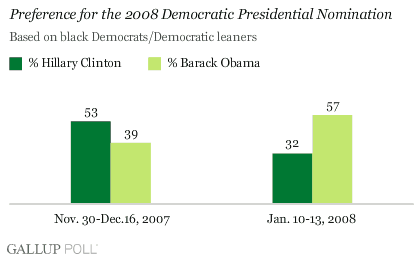
This reversal spans a period when national Democratic preferences for the nomination changed relatively little. This is evident in the fact that over the same period, Clinton had a consistent 17-to 18-point lead among whites.
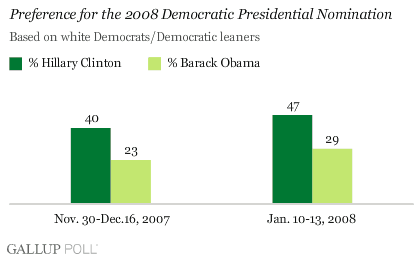
As noted, black Democrats consistently favored Clinton over Obama for the nomination during 2007, although by a much bigger margin in August than at other points during the year. This makes the current reversal all the more significant.
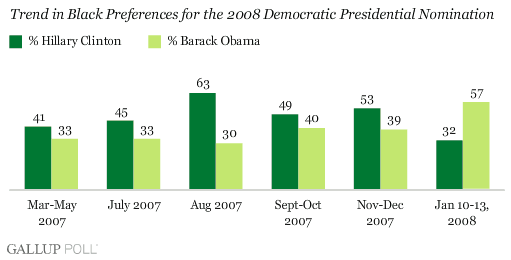
Implications
According to the new poll, 82% of black Democrats say they have a favorable view of Hillary Clinton, down slightly from an average 90% favorable rating in November and December. Her unfavorables increased from 9% to 15%. Thus, while Clinton's King remarks may have cost her some support in the black community, they do not appear to have scarred her image too deeply, at least during the time the new poll was conducted.
Over the same period, Obama's favorable rating rose from an average 78% in November/December to 86% today. However, there has been no change in his unfavorable score; rather, the percentage of black Democrats saying they have no opinion of him dropped from 12% in November/December to 4% today. In short, blacks have been getting more familiar with Obama since the primaries began, and in the process have grown to view him more positively.
This is the first time Obama has been on par with Clinton in terms of blacks' familiarity with the two as public personalities.
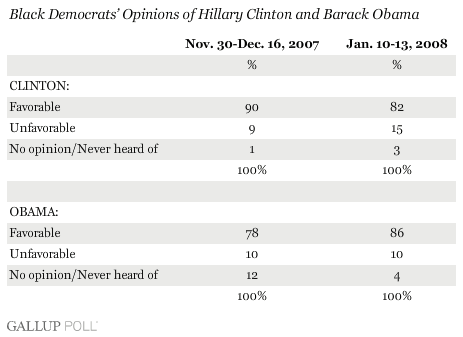
Additionally, blacks who believe Obama would win the general election in November if he leads the Democratic ticket are supporting him in big numbers for the nomination. Two-thirds of those who think he would win if nominated say they favor him in the primaries, while a majority of those who think he wouldn't win favor Clinton.
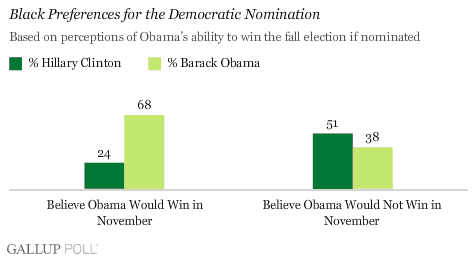
Most black Democrats (63%) think that, if nominated, Obama would win the election in November -- not as many as say this about Clinton (77%), but still a substantial number. Essentially, the "Obama Could Be the First Black President" genie appears to be out of the bottle, and if Obama is able to sustain that perception through the next few states, it could be a potent factor in keeping black Democrats in his column through the primaries.
Survey Methods
The latest results are based on telephone interviews with 2,010 national adults, aged 18 and older, conducted Jan.10-13, 2008. For results based on the total sample of national adults, one can say with 95% confidence that the maximum margin of sampling error is ôÝ2 percentage points.
For results based on the sample of 141 black Democrats and black Democratic leaners, the maximum margin of sampling error is ôÝ9 percentage points.
For results based on the sample of 746 white Democrats and white Democratic leaners, the maximum margin of sampling error is ôÝ4 percentage points.
Interviews are conducted with respondents on land-line telephones (for respondents with a land-line telephone) and cellular phones (for respondents who are cell-phone only).
In addition to sampling error, question wording and practical difficulties in conducting surveys can introduce error or bias into the findings of public opinion polls.
